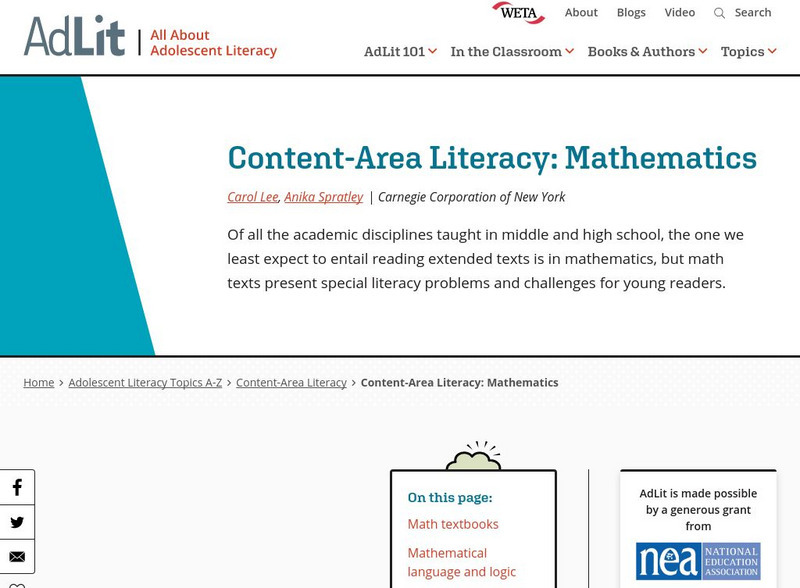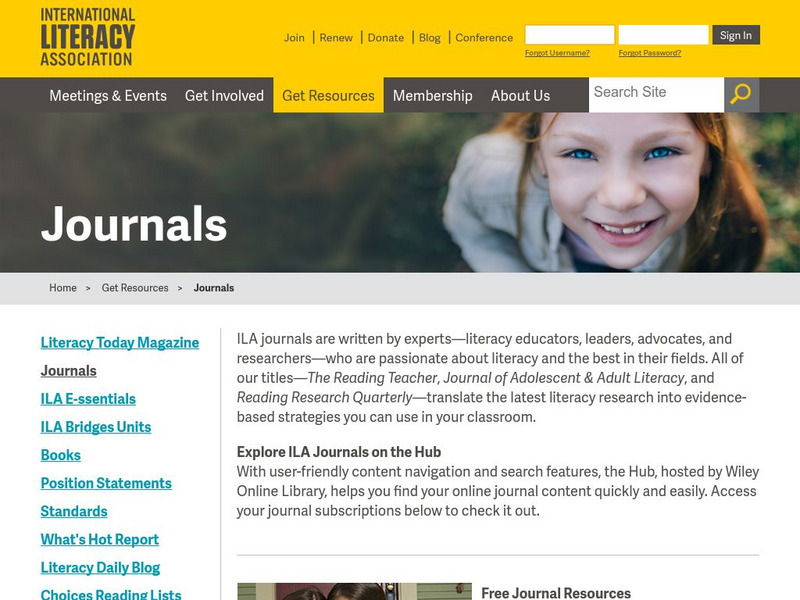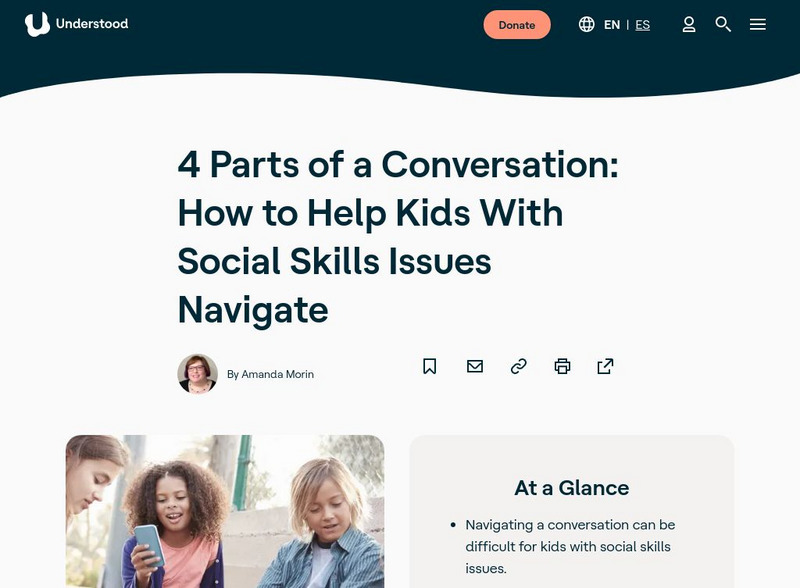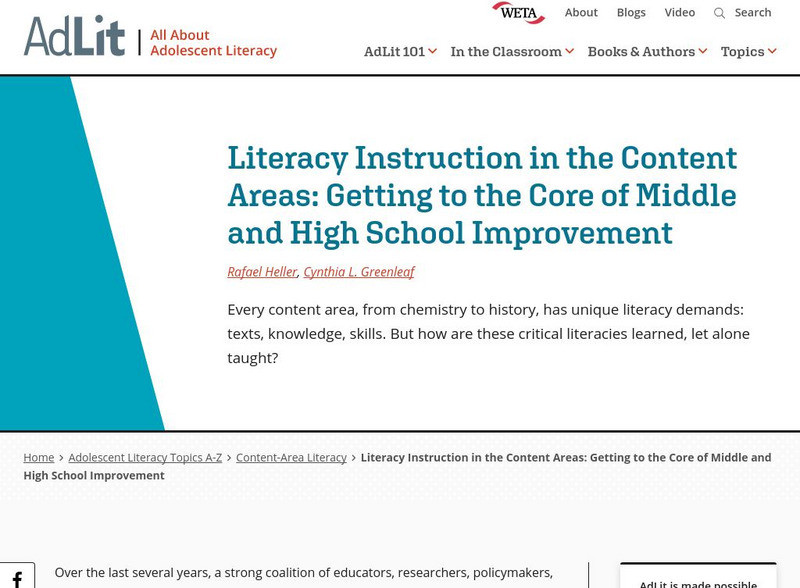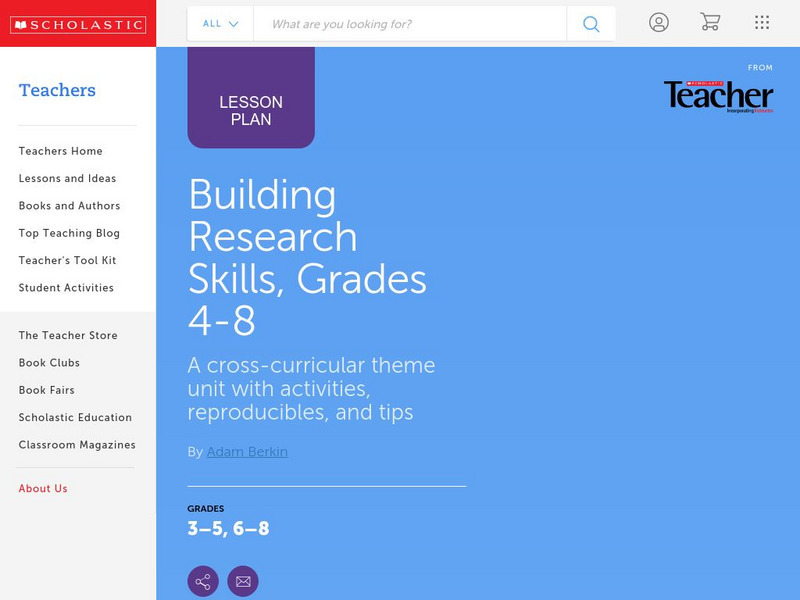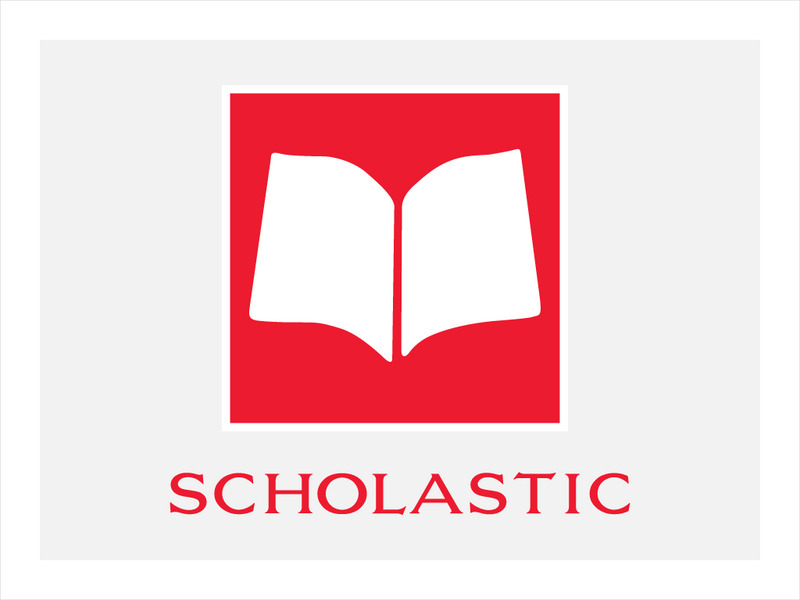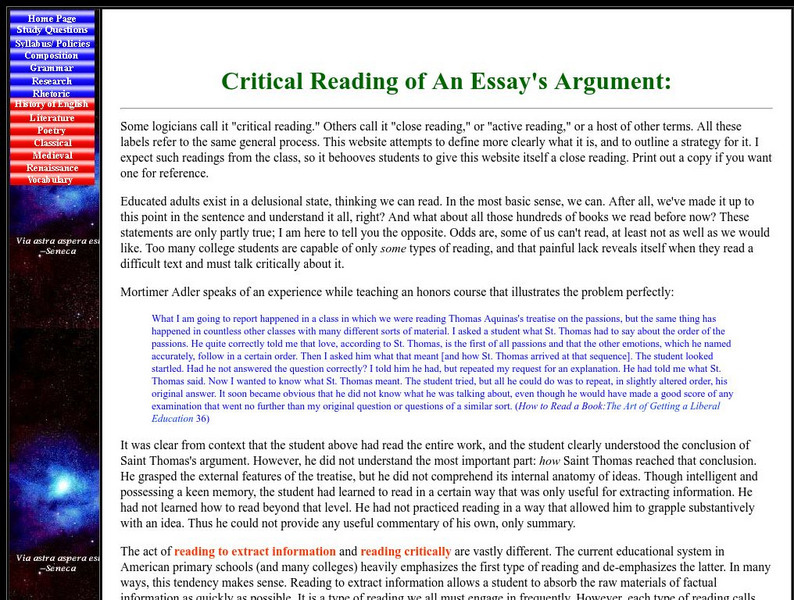Other
Nielsen Norman Group: Low Literacy Users: Writing for a Broad Consumer Audience
An article describing what lower-literacy is and the characteristics and differences between them and higher-literacy users. There is also a section on improving usability for lower-literacy users especially pertaining to the internet.
AdLit
Ad lit.org: Content Area Literacy: Mathematics
Of all the academic disciplines taught in middle and high school, the one we least expect to entail reading extended texts is in mathematics, but math texts present special literacy problems and challenges for young readers.
AdLit
Ad lit.org: Content Area Literacy: History
The ability to read historical documents including contemporary explications about societal, economic and political issues provides a direct link to literacy as preparation for citizenship. As in the other disciplines, schools are unique...
International Reading Association
Reading Online: Content Area Literacy Lessons Go High Tech
Research and ideas about the use of technology to aid in reaching content area literacy goals.
American Institutes for Research
Center on Response to Intervention: Secondary Literacy: Life Changing Results
This 2007 brief provides an orientation to the Content Literacy Continuum (CLC) model a replicable district-level model of instruction to meet the differentiated needs of struggling adolescents. CLC is a five-level model that is aligned...
Association for Supervision and Curriculum Development (ASCD)
Ascd: Building Literacy in Social Studies: Ch 1: Reading Social Studies Texts
Article provides excellent tips and strategies for building comprehension and critical thinking skills in Social Studies. It describes some of the challenges students have with reading and understanding their textbooks.
Understood For All
Understood: 4 Parts of a Conversation:how to Help Kids With Social Skills Issues
Navigating a conversation can be difficult for kids with social skills issues. Here's a look at the four parts of a conversation, the skills involved, and how to help your child navigate each one.
AdLit
Ad lit.org: Content Area Literacy: Science
The demands of comprehending scientific text are discipline specific and are best learned by supporting students in learning how to read a wide range of scientific genres. Besides text structures emphasizing cause and effect, sequencing...
AdLit
Ad lit.org: Key Literacy Component: Fluency
Fluent readers can read text accurately, smoothly, and with good comprehension. Students who get bogged down in the mechanics of reading have trouble with this skill. With proper instruction, struggling readers can improve their fluency.
Edutopia
Edutopia: Why Media Literacy Is Not Just for Kids
Do you know the difference between social media skills and overal media literacy? Learn why these skills are not just valuable to students, but to teachers and parents as well.
AdLit
Ad lit.org: Literacy Instruction in the Content Areas: The Core of Improvement
Every content area, from chemistry to history, has unique literacy demands: texts, knowledge, skills. But how are these critical literacies learned, let alone taught?
AdLit
Ad lit.org: Literacy Coaching in the Middle Grades
From time constraints to a de-emphasis on literacy to a limited research base, coaches in middle schools face challenges that do not exist in the elementary grades.
The Environmental Literacy Council
Environmental Literacy Council: Petroleum
Petroleum and petroleum-based products have played an impressive role as energy for the 20th century. Learn about its uses, benefits, increased consumption, effects on our environment, and the many new replacement technologies.
Other
Six Minutes: Speech Analysis #1: How to Study and Critique a Speech
Dlugen presents a detailed collection of tips to observe when critiquing others' speeches. This skill is critical in improving individual presentation abilities. SL.9-10.3 Eval Presentation. CCSS.ELA-Literacy.CCRA.SL.3, SL.9-10.3 Eval...
Scholastic
Scholastic: Building Research Skills, Grades 4 8
Students in Grades 4 through 8 will benefit from these research skills activities. This resource provides several learning activities and tips. CCSS.ELA-Literacy.WHST.6-8.7 Conduct short research projects
Other
University of Edinburgh: Conversation as Communication
At this site from the University of Edinburgh, the author claims that planning and control produce good communication. CCSS.ELA-Literacy.CCRA.SL.1
International Literacy Association
International Literacy Association: How to Help Students Interpret Digital Texts
How can we help students to move beyond summary and toward interpretation? A combination of digital popular culture modeling, heuristics, and choice - along with digital composition - can initiate that process. Interpretation combines...
International Literacy Association
International Literacy Association: Teaching the Skill of Self Correction
As teachers, one of our goals is for every student to read and comprehend at or above grade level. We want students to take ownership of their reading, monitoring themselves while they are reading and self-correcting when they need to....
Other
Constructing Critical Literacy Practices Through Technology Tools and Inquiry
This journal article examines how the use of technology has helped to promote critical thinking and creativity. The article includes examples specifically focused on Ray Bradbury's "Fahrenheit 451."
AdLit
Ad lit.org: Organizations That Promote Adolescent Literacy
From lesson plans and classroom tools to free books and opportunities to publish students' work, nonprofit organizations have a lot to offer parents, teachers, and struggling readers themselves. Learn about some nonprofits with a...
Scholastic
Scholastic: What Is Dramatic Play and How Does It Support Literacy Development
This article focuses on a specific kind of play: dramatic play, or, as it's sometimes called, pretend play, imitative play, and symbolic play. Read why this type of play is important and examples of how to incorporate it into your...
Other
Study: Sharing I Pads Beats 1 to 1 Programs for Improving Student Learning
This article from Education Week discusses a study where kindergartners who shared iPads in class scored higher on literacy assessments than their peers in 1-to-1 or tablet-free classrooms. The researcher said the results suggest that...
Other
Carson Newman College: Critical Reading of an Essay's Argument
Extensive examination of what it means to critically read an argument. This process is sometimes called "critical reading," or "close reading," or "active reading." First the differences between reading to extract information and reading...
Other
Western Illinois University: Thinking Visually and Evaluating Visuals
This site explores: "An Attitude/Preparing a Frame of Mind," "Thinking Visually: Being First, Doing Second," and "Evaluating Visuals." Click on each to get detailed information. CCSS.ELA-Literacy.CCRA.R.7
Other popular searches
- Media
- Media Education
- Communications and the Media
- Personal Finance
- Money Management
- Media Literacy
- Math Literacy
- Media Studies
- Adult Literacy
- Mass Media
- Media Organizations
- Digital Media

